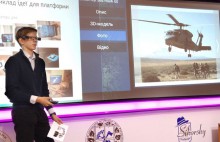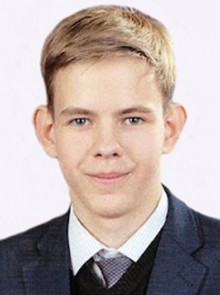17-year-old Kyivite Nikita Gordiienko’s Ukrainian vocabulary includes a variety of English words like machine learning, big data, pattern – “I mostly read the literature in English,” he says. This July the young man won the Google Science Fair finals with his project “Am_I_Fatigued: How to Discover Accumulated Fatigue and Eliminate Risk of Catastrophe?”
There were three other Ukrainian projects among the Top 100: Danylo Kuznetsov’s “Use of properties of heliosynchronous orbits for terraformation of planets using materials easily accessible in the cosmos,” Anton Tykhonenko’s “Functional hand prostheses for people with ectrodactyly,” and Polina Khadeieva’s “Photometric examination of Asteroid 2012 LC1.” Of the hundred finalists 16 global winners will be named August 11.
I met with Nikita shortly after the entrance exams (he is enrolled in the Mathematics and Computer Science Faculty, Polytechnic Institute [KPI] National University of Ukraine). We spoke about innovations that could be made using improvised means, education in Ukraine, and international competitions.
TREMOR, A SIGN OF FATIGUE
Gordiienko: “I used to go in for sports and I know the meaning of fatigue for an athlete as well as for any other human being. My project is meant to objectively determine fatigue. You may believe you aren’t actually tired, but in reality you are no longer capable of doing certain things. I chose the smartphone for my research because it is a [comparatively] simple device and practically everyone has it.
“As fatigue accumulates, the brain can no longer control certain muscles, then you develop a slight hand tremor. This tremor can be detected with the aid of an accelerometer, and almost every smartphone has this device. That was the groundwork of my research.”
EXPERIMENTS
“I asked my relatives and friends to determine the degree of fatigue after completing various activities. They would stretch their hands and the smartphone’s accelerometer would read their movements. After that I processed the data using various kinds of statistical analysis and made conclusions.
“One can have a hand tremor even in a normal physical condition, so for the purposes of my research one should take a test measurement in a normal condition to set fatigue level zero. Any increase in the tremor afterward would indicate a higher level of fatigue.”
TRAVELING WITHOUT FATIGUE
“My technique is useful not only for the athletes. People often travel. Even after a long walk, you may not be aware of your fatigue, but you can measure its level. There are Google Maps and other utilities that will show you an interesting itinerary and a way to follow it without getting too tired. I wish my application were used that way, but I’d also like to help the athletes.
“It could also come in handy for truckers; they have to concentrate on the road for long hours and fatigue often causes traffic accidents with lethal outcomes. Engineers, too, could use it, because precision is what they need in the first place.
“I have submitted my project to various competitions and I’d like to have feedback from the general public, scientists, physicians, people who know about the field of my endeavor. I want to make a product that will actually help people. I’m working on a prototype smartphone gadget that anyone could use.”
SMARTPHONE: PENSIONER’S FRIEND
“In 2013, I found myself in the Google Science Fair finals, that was my first independent research project. That time I also used a smartphone to identify human activities – so if, for example, an elderly person has a fall, the smartphone sends an alarm signal to that person’s relatives. I also tried to use special markers to make some daily routine easier, like using the smartphone to read the label on a package of pills.
“I’ve stopped working on that project because the feedback has been to the effect that this application would help only so many individuals, that this technology couldn’t be used by everyone; that our elderly people aren’t familiar with the smartphone, that they would find it difficult to use it; that this technology is likely to become popular in 20-30 years.”
DIAGNOSING THE ATMOSPHERE
“In 2012, several of my schoolmates became Google Science Fair finalists. I was also on the team, helping with their research, but I was under 13 at the time [children aged 13-18 are eligible to vie in the competition. – Ed.] and couldn’t fly to the States to take part in the presentation. The idea was really cool: measuring exhaust gas in the atmosphere. We bought exhaust gas meters, attached them to our knapsacks and walked up and down Kyiv streets, collecting data. We then wrote it on an online map any user could access and see the most contaminated parts of the city.
“We were just kids at the time. We kept updating the online map for a while, then the team fell apart, as high school life had its priorities like friends, parties, hobbies. If I worked on this idea now that I’m almost a university student and still have time to spare, I’d probably develop some application.”
SOLVING PROBLEMS USING IMPROVISED MEANS
“I started taking part in research competitions sometime in Grade 8, Lyceum No. 142 with emphasis on physics and mathematics. My physics teacher Nelia Menshykova familiarized me with a competition of the Small Academy of Sciences and encouraged me to vie in a number of other competitions. My teachers would offer me some ideas and I’d find others on the Internet. I tried to use my projects to solve certain problems and submitted them to various competitions. I wanted feedback from Ukraine and other countries, so I could figure out what I really wanted to study in the future.
“I’d more often than not place third during the Small Academy competitions, considering that the jury preferred projects relying on lab tests, whereas I tried to solve problems at home, using improvised means. What did I have except the smartphone and PC? I could buy sensors for the phone and generate computer programs. And so there wasn’t much to write home about my Small Academy competitions, but I would become Google Science Fair and Intel-Techno Ukraine finalist. In fact, my classmate Mykyta Riepin and I won a special Intel award.”
GROWING IDEAS LIKE FLOWERS
“In 2012, my parents suggested that I take part in the Google Science Fair with my classmate. His parents thought so, too. They believed we could come up with a good idea and they would help us get the required equipment. It was then we conceived the exhaust gas idea. I liked the process of developing the project, expanding the idea, the way a biologist is growing a rare floral species. I decided to keep working on other ideas.
“Recently I read about Huge/Big Data. People confront huge amounts of data that have to be sorted out, cross referenced. This is where Huge Date steps in. I guess I’ll keep researching it at the university.”
UKRAINIAN HIGHER SCHOOLS SHOW DECENT STANDARD
“I wouldn’t even consider the idea of getting enrolled in a university abroad. Some of my classmates started studying Polish, German or other languages several years before graduation, so they could apply for enrollment outside Ukraine. I know only English, but my command of the language leaves much to be desired, so studying abroad was out of the question. However, starting in the third or fourth year at the university, one can take part in a student exchange program. I will, after learning the language well enough and realizing what course I want to take and under whose able academic guidance.
“Certain Ukrainian higher schools show a decent standard. This and studying at home, taking online courses, would provide an academic standard matching that of German and other European universities. For example, graduates of KPI’s IT faculty are successfully employed by a number of leading high-tech companies like Google, Apple, Microsoft, and Samsung. That was why I wanted to get enrolled in the KPI. Well, I was, several days ago. Each student majoring in engineering wants to get to the Silicon Valley, study at Stanford. My cherished dream and I hope it will come true in a couple of years.”
TRY HARD AND YOU’LL DO IT!
“Studying at the lyceum wasn’t easy and getting prepared for external evaluation and certain competitions was hard. I’d sleep 5-6 hours at times, but I had an experience of perseverance training. In 2015, after a year of training, I made the charity half-marathon Vyshyvanka Run, so I’m not scared by hardships. If you try hard, you’ll do it!
“Smartphone is my key research instrument. I want to demonstrate that science can be created at closed labs with professors and at home, if one knows how to use things one has on hand.”








